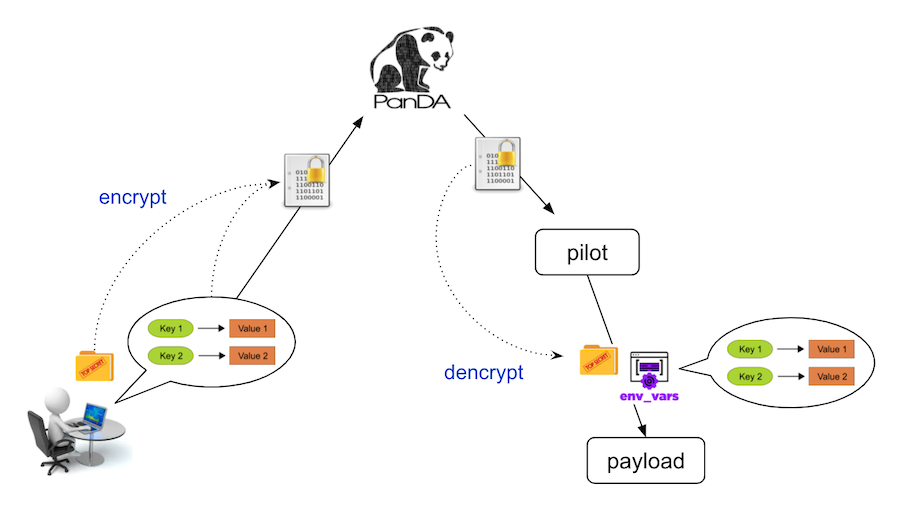Using secrets
Introduction
A secret is a small amount of sensitive data such as an access token and a password. PanDA allows users to define arbitrary key-value strings to feed secrets to jobs. They are encrypted in PanDA and decrypted on the compute node, and are exposed to jobs as environment variables. Note that the key-values are random strings from PanDA’s point of view, and users can further encrypt those strings by themselves, so the system should not abuse the sensitive information.

How to manage secrets
pbook provides following functions to manage secrets.
set_secret
list_secrets
delete_secret
delete_all_secrets
You can define a set of key-value strings using set_secret.
>>> # set_secret(key, value)
>>> set_secret('MY_SECRET', 'random_string')
INFO : OK
The key is used as the environment variable name on worker nodes. The value must be a string.
If you want to define non-string secrets, serialize them using json.dumps,
base64.b64encode, or something, beforehand. E.g.,
>>> # define a dictionary secret using json.dumps
>>> import json
>>> set_secret('MY_SECRET_DIC', json.dumps({'a_key': 'a_value'}))
INFO : OK
It is also possible to upload secret files if their size is less than 1000 kB,
>>> # upload a secret file
>>> set_secret('my_secret_file.dat', '/somewhere/secret_file_path', is_file=True)
INFO : OK
so that jobs get those files on worker nodes, where the key is the remote filename while the value is the local file path.
list_secrets shows all secrets.
>>> # list_secret(full=False)
>>> list_secrets()
Key : Value
------------------ : --------------------
MY_SECRET : random_string
MY_SECRET_DIC : {"a_key": "a_value"}
my_secret_file.dat : H4sIABmjwWEAA+3TTU7DMBA...
...
Value strings are truncated by default. Set full=True to see entire strings.
You can delete secrets using delete_secret and/or delete_all_secrets.
Using secrets in your jobs
prun has the –useSecrets option to feed secrets into jobs on worker nodes.
Once jobs get started the secrets should be available as environment variables or local files
in the current directory.
Your application would do something like
import os
import json
# using an ordinary secret
do_something_with_a_secret(os.environ['MY_SECRET'])
# using a dictionary secret
dict_secret = json.loads(os.environ['MY_SECRET_DIC'])
do_something_with_a_dictionary_secret(dict_secret['a_key'])
# using a secret file
with open('my_secret_file.dat', 'wb') as f:
do_something_with_a_secret_file(f)